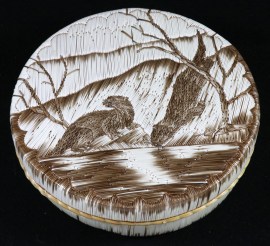
The Department of Anthropology is pleased to announce that Dr. Heather Howard has been awarded a distinguished 2020–2021 Whiting Public Engagement Fellowship. Dr. Howard (left) is an Associate Professor of Anthropology. Her work focuses on collaborative, community-based, and participatory approaches to research which promote the value of Indigenous knowledge frameworks to scholarship.
The Whiting Public Engagement Program is a national grant that advances scholarly work applying the humanities in ways that benefit communities. The program’s fellowships recognize faculty whose work interacts with the public and brings together discussion on topics of significance. Dr. Howard is one of only six Fellows awarded across the country this year. The fellowship, in the form of $50,000, will support Dr. Howard’s project entitled “Waganakising Quillwork: A Portal to Share Indigenous Knowledge”. With this fellowship, Dr. Howard will engage in a collaborative project with Waganakising Odawak (Little Traverse Bay Bands of Odawa Indians) to build a digital portal for Waganakising heritage.

The Waganakising Odawak are leaders in encouraging positive relationships between Indigenous and non-Indigenous people while preserving their culture and advancing their self-sufficiency. This portal, and the process of its creation, will initially focus on porcupine quillwork traditions and align with Waganakising initiatives supporting historical and traditional arts knowledge while cultivating intercultural respect and understanding. As a Tribal-governed platform, the portal will be curated by Indigenous historians, makers, and other knowledge-holders of the Waganakising Odawak in Michigan.
Waganakising porcupine quillwork is a beautiful decorative art but is also a significant and profound cultural practice representing Waganakising history, Tribal sovereignty, and environmental conservation. This art embodies the respectful relationships between the human and non-human world which are interwoven in Waganakising oral traditions and storytelling.

These dimensions of the art are brought to the foreground by porcupine quillwork master and teacher Elder Yvonne Walker Keshick (left), who is known not only for her artistry, but also her way of relating that work to responsible gathering and protecting resources, Tribal rights, and the history of regional trade and political negotiations. Quillwork and Waganakising artists like Yvonne Walker Keshick therefore play a central role in perpetuating cultural knowledge and educating non-Indigenous neighbors about respect for Tribal ways of life.
To create this interactive tool, Waganakising historians and knowledge-holders will lead community events with Tribal members to identify heritage objects for including in the portal and to discuss the portal’s design. The project will begin by drawing on materials that are already digitized by the Great Lakes Research Alliance for the Study of Aboriginal Arts and Cultures (GRASAC) with further technical support from the MSU Digital Heritage Imaging and Innovation Lab. The Waganakising portal will be a gateway to cultural heritage items and discussions by digitally drawing together materials held across the country and internationally into a centralized, Indigenous community managed platform.

Images:
Upper right – A quill box featuring otters made by Yvonne Walker Keshick using all natural quills. Image courtesy of MSU Museum collections, ID 2017:24.108. Photo by Pearl Yee Wong.
Lower left – Yvonne Walker Keshick with her granddaughter teaching quillwork on birch bark at the Great Lakes Folk Festival, East Lansing, August 8, 2015. Photo by Pearl Yee Wong.
Lower right – An unfinished quill box used for teaching and demonstration, made by Yvonne Walker Keshick using all natural quills. Image courtesy of MSU Museum collections, ID 2017:24.1. Photo by Pearl Yee Wong.